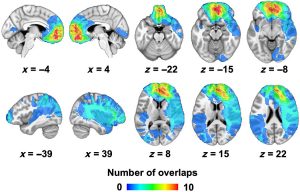Mind Wandering is Associated with Poorer Mental Health and Greater Creative Thinking
By John M. de Castro, Ph.D.
“Mind-wandering in the sense of the mind moving freely from one idea to another has huge benefits in terms of arriving at new ideas. It’s by virtue of free movement that we generate new ideas, and that’s where creativity lies.” – Kalina Christoff
We spend a tremendous amount of waking time with our minds wandering and not on the present environment or the task at hand. We daydream, plan for the future, review the past, ruminate on our failures, exalt in our successes. In fact, we spend almost half of our waking hours off task with our mind wandering. Mindfulness is the antithesis of mind wandering. When we’re mindful, we’re paying attention to what is occurring in the present moment. In fact, the more mindful we are the less the mind wanders and mindfulness training reduces mind wandering.
You’d think that if we spend so much time with the mind wandering it must be enjoyable. But, in fact research has shown that when our minds are wandering, we are actually less happy than when we are paying attention to what is at hand. There are times when mind wandering may be useful, especially in regard to planning and creative thinking. But, for the most part, it interferes with our concentration on the present moment and what we’re doing and makes us unhappy. But mind wandering is also associated with creative thinking. So, it makes sense to look at the relationship of mind wandering with creative thought and mental illness.
In today’s Research News article “Mind wandering in creative problem-solving: Relationships with divergent thinking and mental health.” (See summary below or view the full text of the study at: https://www.ncbi.nlm.nih.gov/pmc/articles/PMC7180068/ ) Yamaoka and colleagues recruited college students and had them complete measures of creative (divergent) thinking, including fluency, flexibility, and originality subscales, depression, schizotypal personality, and mind wandering.
They found that the higher the levels of mind wandering, the higher the levels of divergent thinking, including fluency, flexibility, and originality subscales, and the higher the levels of depression and schizotypal personality. This was true with both bivariate and multiple linear correlations. People with schizotypal personality tend to be loners, have difficulty with relationships, and can display odd speech and behavior. These people also appear to have high levels of mind wandering. This along with the heightened depression suggests that mind wandering is associated with mental illness.
These results are correlational and as such causation cannot be determined. But these findings suggest that mind wandering is good news and bad news. The unusual thinking generated during mind wandering is associated with creativity. But at the same time, it is associated with poorer mental health. Mindfulness training reduces mind wandering and improves depression and mental illness suggesting that mindfulness training may be an antidote to the mental illness associated with mind wandering.
So, mind wandering is associated with poorer mental health and greater creative thinking.
“A human mind is a wandering mind, and a wandering mind is an unhappy mind. The ability to think about what is not happening is a cognitive achievement that comes at an emotional cost.” – Matthew A. Killingsworth
CMCS – Center for Mindfulness and Contemplative Studies
This and other Contemplative Studies posts are also available on Google+ https://plus.google.com/106784388191201299496/posts and on Twitter @MindfulResearch
Study Summary
Yamaoka, A., & Yukawa, S. (2020). Mind wandering in creative problem-solving: Relationships with divergent thinking and mental health. PloS one, 15(4), e0231946. https://doi.org/10.1371/journal.pone.0231946
Abstract
Previous research has shown that mind wandering has both positive and negative effects. Mind wandering may improve creative problem solving; however, it could also lead to negative moods and poor mental health. It has also been shown that some forms of mental illness are positively related to creativity. However, the three factors of mind wandering, divergent thinking, and mental health have not been examined simultaneously, so it is possible that these relationships are manifested by spurious correlations. Therefore, we examined the relations among the three factors while controlling for each of their confounding effects. We asked 865 participants (458 men, 390 women, 17 unknown; Mage = 18.99 years, SD = 1.16) to complete a questionnaire measuring mind wandering traits, divergent thinking, and mental health measures including depressive symptoms and schizotypal personality. Multiple regression analysis showed that people who reported more depressive symptoms, schizotypal personality, and divergent thinking, were more likely to engage in mind-wandering. Our results indicated that frequency of mind wandering was linked to a risk of poorer mental health as well as to higher divergent thinking ability. In future research, we will examine the features of mind wandering related to divergent thinking and mental health by considering the contents of wandering thoughts and whether they are ruminative or not. We also need to examine whether the same results will be found when studying professionals in creative occupations, and when using different scoring methods in divergent thinking tests.
https://www.ncbi.nlm.nih.gov/pmc/articles/PMC7180068/
